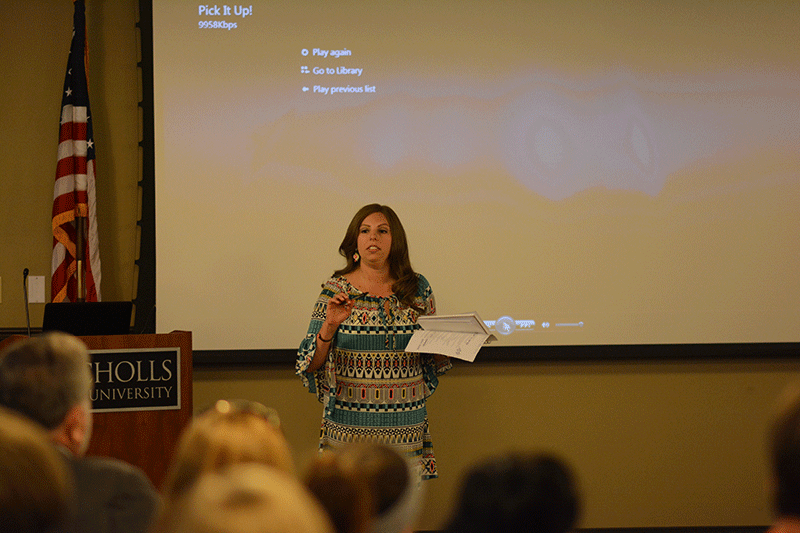Student Government Association proposes bandwith upgrade
Photo by: Jeffery Miller
SGA president Lillie Bourgeois speaks to student leaders at the biannual President’s Forum September 29th.
Current Internet restrictions and quality are issues that the Student Government Association is hoping to deal with at Nicholls this semester. SGA is proposing to upgrade campus bandwidth with $80,000 from the Technology Department budget.
The current bandwidth at Nicholls is set at a 500-megabyte cap, which is actually met every day from 9:00 a.m. to midnight.“SGA is going to submit the proposal, and it’s going to be either the president or the vice president,” Peyton Chiasson, director of student rights and grievances, said, “and of course the money isn’t coming from SGA. It’s coming from Tech Fee Committee. We are writing the proposal to get Tech Fee to pay for the firewall.”
Chiasson presented the campus bandwidth issue to SGA after a large amount of network complaints last semester.
A firewall is a piece of computer system that is designed to block unauthorized access while permitting outward communication. Nicholls’ current firewall was installed in 2008, almost six years ago.
The new firewalls should allow for more throughput and after their installation the school could go from 500mgbs to 1 gigabyte. Bytes are units of computing and binary measurements that are used to provide and operate Internet services.
“The only way that SGA is really going to step in is if Tech Fee can’t afford the whole $80,000 chunk,” Chiasson said. “Every time you type in Nicholls.edu, you’re going through that firewall. It affects literally every single person that uses Moodle, Banner and the Nicholls site.”
In 2008, each student had approximately one device on them, which accessed Internet at Nicholls. In 2015, each student has approximately five devices which connect to the Internet including laptops, cell-phones and tablets,” Slade Besson, director of telecom and networking, said.
Streaming video services like Netflix and Youtube only stack upon increased device usage. A study from Variety, in 2014, marked Netflix as the largest consumer of North American bandwidth, with rates as high as 35.9% of total bandwidth.
“We have to restrict things like Netflix and Youtube for the rest of the stuff to work,” Besson said. “We max out every single day. Once we throw that throttle up, we can release on those restrictions.”
The upgrade from 500mgbs to 1gb is a solution to Internet satisfaction, but not to Internet cost. Currently the university pays $830 to the Louisiana Optical Network Initiative a month for Internet service; once the upgrade to 1gb takes place, it’ll be closer to $1,600.
These upgrades and issues will only be addressed depending on how high SGA’s proposal scores are when the Student Technology Fee Committee meets this fall. The department is mostly comprised of students who rate proposals from small classroom upgrades to campus-wide projects such as this.
“The grant process right now has begun, so we’ve sent out proposals.” Charles Ordoyne, Chief Information Officer, said. “Right after thanksgiving break, the committee ranks the proposals and this one should rank pretty high since the students are submitting it themselves. Once they are finalized, we go to procurement. If it’s possible, we can start getting equipment in January, but the installation will need to be timed for when the campus will be pretty much shut down.”
The Student Technology Fee Committee meets twice a semester; the second meeting is where proposals are going to be scored.
The new firewalls are not just for throughput, but also a server-hijacking preventative. On Aug. 27, UNO came under a Denial of Service Attack, which flooded LONI’s network and consequently took Nicholls offline for a small span of time.
“If we were attacked, our firewall would be our first defense mechanism. That was the problem with UNO, they didn’t have the proper tools to stop it or shut it down,” said Besson.
Students who are having device problems or Internet connectivity problems can fill out a work order to the IT department or pick up a self-help form from that department.







